语法:法语语法之时态汇总(2)
法文基本语法、时态及部分动词变位归纳总结
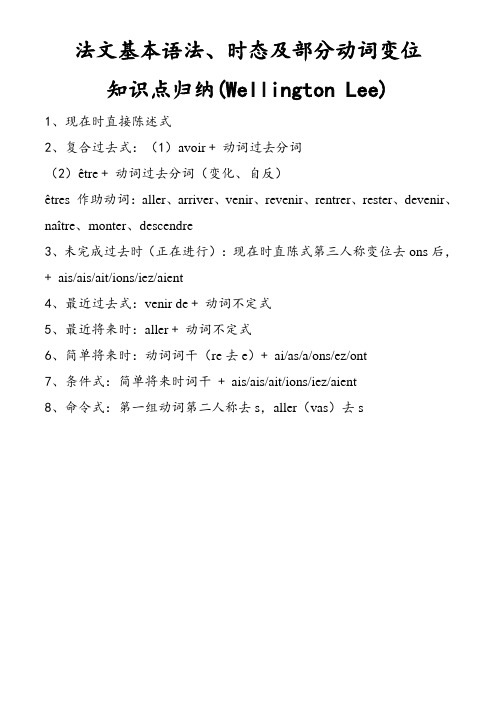
法文基本语法、时态及部分动词变位知识点归纳(Wellington Lee)
1、现在时直接陈述式
2、复合过去式:(1)avoir + 动词过去分词
(2)être + 动词过去分词(变化、自反)
êtres 作助动词:aller、arriver、venir、revenir、rentrer、rester、devenir、naître、monter、descendre
3、未完成过去时(正在进行):现在时直陈式第三人称变位去ons后,+ ais/ais/ait/ions/iez/aient
4、最近过去式:venir de + 动词不定式
5、最近将来时:aller + 动词不定式
6、简单将来时:动词词干(re去e)+ ai/as/a/ons/ez/ont
7、条件式:简单将来时词干 + ais/ais/ait/ions/iez/aient
8、命令式:第一组动词第二人称去s,aller(vas)去s
第一组动词:e,es,e,ons,ez,ent
间接宾语人称代词:。
法语语法:法语时态总结
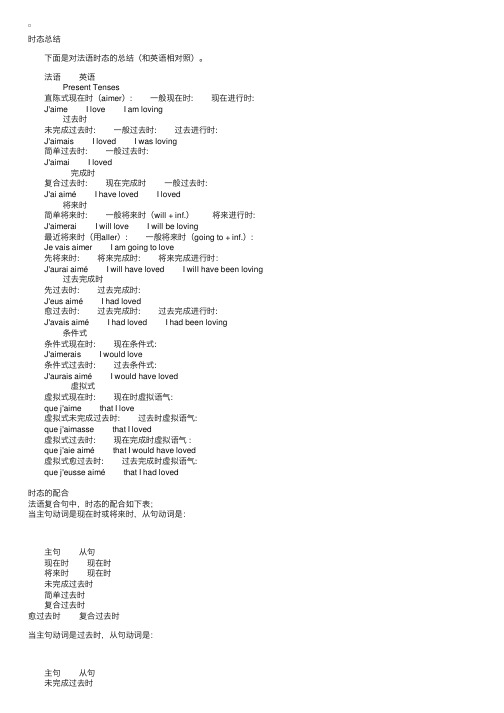
时态总结 下⾯是对法语时态的总结(和英语相对照)。
法语 英语 Present Tenses 直陈式现在时(aimer): ⼀般现在时: 现在进⾏时: J'aime I love I am loving 过去时 未完成过去时: ⼀般过去时: 过去进⾏时: J'aimais I loved I was loving 简单过去时: ⼀般过去时: J'aimai I loved 完成时 复合过去时: 现在完成时 ⼀般过去时: J'ai aimé I have loved I loved 将来时 简单将来时: ⼀般将来时(will + inf.) 将来进⾏时: J'aimerai I will love I will be loving 最近将来时(⽤aller): ⼀般将来时(going to + inf.): Je vais aimer I am going to love 先将来时: 将来完成时: 将来完成进⾏时: J'aurai aimé I will have loved I will have been loving 过去完成时 先过去时: 过去完成时: J'eus aimé I had loved 愈过去时: 过去完成时: 过去完成进⾏时: J'avais aimé I had loved I had been loving 条件式 条件式现在时: 现在条件式: J'aimerais I would love 条件式过去时: 过去条件式: J'aurais aimé I would have loved 虚拟式 虚拟式现在时: 现在时虚拟语⽓: que j'aime that I love 虚拟式未完成过去时: 过去时虚拟语⽓: que j'aimasse that I loved 虚拟式过去时: 现在完成时虚拟语⽓ : que j'aie aimé that I would have loved 虚拟式愈过去时: 过去完成时虚拟语⽓: que j'eusse aimé that I had loved 时态的配合法语复合句中,时态的配合如下表;当主句动词是现在时或将来时,从句动词是: 主句 从句 现在时 现在时 将来时 现在时 未完成过去时 简单过去时 复合过去时愈过去时 复合过去时当主句动词是过去时,从句动词是: 主句 从句 未完成过去时简单过去时 未完成过去时 先将来时 未完成过去时 复合过去时先过去时 愈过去时。
法语时态总结

法语时态现在时 le présent de l’indicatif将来时 Le future de l’indicatif最近将来时 Future proche简单将来时 Future simple先将来时 Future antérieur未完成过去时L’imparfait de l’indicatif复合过去时 Le passé composé de l’indicatif愈过去时 Le plus—que—parfait de l’indicatif条件式 Le conditionnel (présent/passé)虚拟式 Le subjonctif(présent/passé/imparfait/plus-que—parfait)被动态 La forme passive先过去时 Passé antérieur简单过去时 Passé simple正在进行时 Présent progressif最近过去时 Passé récent1 现在时:描写发生的动作或状态/表达习惯性动作/描述真理例:j'écris un article Aimer FinirIl a mal àl’estomac J'aime Je finisMa mère va au bureau à 7h du matin Tu aimes Tu finisL’eau bout à 100°c Il/elle aime Il/elle finitJ’arrive tout de suit Nous aimons Nous finissonsV ous aimez V ous finissezIls/elles aiment Ils/elles finissent第一组(—er) 第二组 (-ir) 第三组(—re)2简单将来时动词变化:以 -rai —ras —ra —ra —rons —rez —ront —ront 结尾Etre AvoirJe serai J'auraiTu seras Tu aurasIl/elle sera Il/elle auraNous serons Nous auronsV ous serez V ous aurezIls/elles seront Ils/elles auront例:Demain j'irai au cinéma。
法语各个时态详细介绍整理版pdf

法语各个时态详细介绍整理版.pdf 法语语法中的时态可以分为以下几种:现在时态(leprésent)、过去时态(le passé composé、l'imparfait、le plus-que-parfait)、未来时态(le futur)、将来进行时态(le futurproche)、过去进行时态(le passé récent)、现在进行时态(le présent progressif)、过去完成时态(le passé antérieur)、过去未完成时态(le passé simple)、现在完成时态(le présent parfait)、将来完成时态(le futur antérieur)。
以下是对这些时态的详细介绍:一、现在时态(le présent):现在时态用于表示正在进行的动作。
例如:∙Je mange une pomme.(我正在吃一个苹果。
)∙Tu vas à l'école.(你去学校。
)∙Il travaille dans un bureau.(他在办公室工作。
)二、过去时态:1. 过去完成时态(le passé composé):过去完成时态用于表示过去某个时间点或某个动作的结束。
它由助动词“avoi r”或“être”的现在时态形式加上过去分词构成。
例如:∙J'ai mangé une pomme.(我吃了一个苹果。
)∙Elle est allée au cinéma.(她去了电影院。
)2. 过去未完成时态(l'imparfait):过去未完成时态用于描述过去某个时间点或某个动作的背景。
例如:∙J'étais fatigué hier soir.(昨晚我很累。
法语各种时态
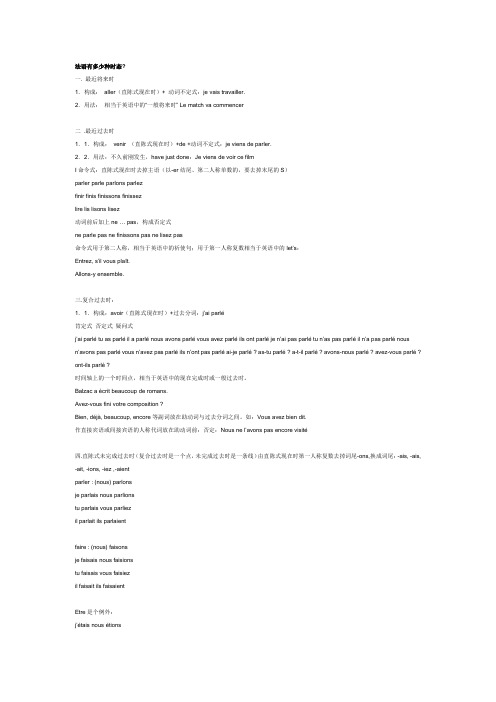
法语有多少种时态?一. 最近将来时1.构成:aller(直陈式现在时)+ 动词不定式:je vais travailler.2.用法:相当于英语中的―一般将来时‖ Le match va commencer二 .最近过去时1.1.构成:venir (直陈式现在时)+de +动词不定式:je viens de parler.2.2.用法:不久前刚发生,have just done:Je viens de voir ce filmI命令式:直陈式现在时去掉主语(以-er结尾、第二人称单数的,要去掉末尾的S)parler parle parlons parlezfinir finis finissons finissezlire lis lisons lisez动词前后加上ne … pas,构成否定式ne parle pas ne finissons pas ne lisez pas命令式用于第二人称,相当于英语中的祈使句;用于第一人称复数相当于英语中的let’s:Entrez, s’il vous plaît.Allons-y ensemble.三.复合过去时:1.1.构成:avoir(直陈式现在时)+过去分词:j’ai parlé肯定式否定式疑问式j’ai parlé tu as parlé il a parlé nous avons parlé vous avez parlé ils ont parlé je n’ai pas parlé tu n’as pas parlé il n’a p as parlé nousn’avons pas parlé vous n’avez pas parlé ils n’ont pas parlé ai-je parlé ? as-tu parlé ? a-t-il parlé ? avons-nous parlé ? avez-vous parlé ? ont-ils parlé ?时间轴上的一个时间点,相当于英语中的现在完成时或一般过去时。
法语时态总结(二)
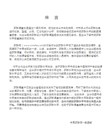
当主动语态由on充当时,在被动语态是可以省掉
On a réserve toutes les table.有人定了位子
Toutes les table ont été réservées.所有位子都被定了
八.先将来时
1. 构成
பைடு நூலகம்
avoir (简单将来时)+ 过去分词: j’aurai parlé
Ils seront sortis quand vous rentrerez à la maison.
Il aura réparé la voiture avant la pluie
九.直陈式先过去时:
1.和愈过去时同样表示过去的过去,但它仅用于书面语
构成avoir (简单过去时)+ 过去分词 : j’eus parlé
Nous ferons une promenade quand nous aurons fini nos devoirs.Elle vous écrira dès qu’elle sera arrivée à Paris.
也可用于主句或独立句中,一般都有状语从句或时间状语限制;相当于英语中的将来完成时:
il aura parlé ils auront parlé il sera allé ils seront allés
elle aura parlé elles auront parlé elle sera allée elles seront allées
se lever
je me serai levé (e) nous nous derons levés (es)
法语时态总结(二)
法语时态总结(二)
法语时态总结及用法

法语时态总结及用法首先,记住一个规律:任何时态的过去时=avoir /être 的该时态+动词的过去分词一.直陈式现在时1.主要用来表示当下正发生的动作或事实:Je tape un texte sur mon ordinateur.(我在电脑上打字),也可以表示一个有持续性的动作:Je travaille depuis cet après-midi.(我从下午开始都在工作)。
一个状态:Il fait sombre.(天气阴沉)一种习惯:Elle se couche chaque jour à midi.(她每天下午都睡午觉)一个公认的事实:La Terre tourne autour du Soleil.(地球绕着太阳转)2.动词形式为直陈式下的动词变位,需要与主语性数配合二.复合过去时1.主要表示过去某个时间点发生的动作,有明显的开始和结束时间2.构成:助动词avoir /être +过去分词(le participe passé)3.形式:a.第一组规则动词(-er):将-er变为-éb.第二组规则动词(-ir):将-ir变为-ic.特殊:-u;-i;-is;-t 。
这里可以用网友总结的一个口诀来记4.运用:所有的及物动词及大部分不及物动词在复合时态中,都用avoir 做助动词;表示位置和状况变动的不及物动词(如,naître, mourir, tomber, monter等) 以及所有的代词都用être 做助动词。
5.配合:avoir 做助动词的时候,若直接宾语提前,则过去分词要和直接宾语进行性数配合,其他情况下都不用配合;而être 做助动词的时候,除了间接宾语提前时候不用配合,其他情况下都要进行性数配合。
三.简单将来时1.形式:词缀为-ai, -as, -a, -ons, -ez, -ont2.构成第一组规则动词(-er)和第二最规则动词(-ir):动词原形+上述词缀第三组:特殊词根+上述词缀(常见如下)3.用法:表示将要发生的动作或者在未来某一段时间内存在的状态。
法语语式和时态总结
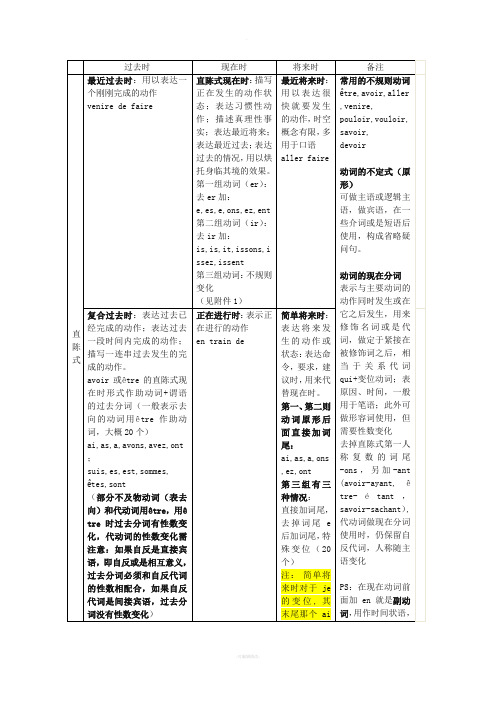
过去时最近过去时:用以表达一个刚刚完成的动作venire de faire复合过去时:表达过去已经完成的动作;表达过去一段时间内完成的动作;描写一连串过去发生的完成的动作。
avoir 或être 的直陈式现在时形式作助动词+谓语的过去分词(一般表示去向的动词用être 作助动词,大概 20 个)ai, as, a, avons, avez, ont;suis, es, est, sommes, êtes, sont.(部分不及物动词(表去向)和代动词用être,用être 时过去分词有性数变化,代动词的性数变化需注意:如果自反是直接宾语,即自反或是相互意义,过去分词必须和自反代词的性数相配合;如果自反代词是间接宾语,过去分词没有性数变化。
)未完成过去时:描写过去的背景,人物,环境,气氛;表示过去的习惯性动作;表达过去起止时间不明确的动作;表示动作发生的同时性(一个动作发生时,另一个动作正在延续;两个动作都在延续);在 Si 引导的从句中,与条件时配合,表达实现可能性不大。
动词的直陈式第一人称复数形式去掉词尾 ons,加:ais, ais, ait, ions, iez, aient.(étais, étais, était, étions, étiez, étaient)Commercer-commençais, commencionsManger-mangeais, mangionsétudier-étudiais, étudiionsvoir-voyais, voyions愈过去时:表达在过去某一动作之前就完成的动作,一般和复合过去时,未完成过去时或简单过去时配合使用;在si引导的条件句中,与条件式过去时配合,表示与事实完全相反的假设avoir 或être 的直陈式未完成过去时形式作助动词 + 谓语的过去分词avais,avais,avait,avions,aviez,avaientétais,étais,était,étions,étiez,étaient简单过去时:表示过去某一确定时间内已经完成的某一行为或一系列动作;与未完成过去时配合,描写新出现的情况.动词过去分词以é结尾的,去掉é加词尾:ai,as,a,âmes,âtes,èrent其谓语动词的过去分词以i 结尾的,去掉i 加词尾:is,is,it,îmes, îtes,irent其谓语动词的过去分词以u 结尾的,去掉u 加词尾:us,us,ut, ûmes,ûtes,urent特殊:être il fut ils furentavoir il eut[ily] ils eurent[lizy :r]venir il vint ils vinrent注:简单过去时不再用于口语,仅限于小说、传记和历史记载,其动词变位往往也仅限于第三人称单复数,因此对初学者来说,达到能够识别就可以了。
大学法语语法之时态

大学法语语法之时态一、直陈式现在时1.以-er结尾的动词:去掉-er,依次加-e,-es,-e,-ons,-ez,-ent.2. 以-ir结尾的动词:去掉-ir,依次加-is,-is,-it,-issons,-issez,-issent.二、复合过去时(Passé composé)1. 意义:表示过去发生的或已经完成的动作2. 构成:avoir (或être)的直陈式现在时+ 过去分词3. .以être作助动词的不及物动词:naitre, mourir. monter, descendre, tomber, arriver, entrer,venire, rester, devenir, passer, partir, sortir, aller.三、最近过去时(Passé immédiat)1. 意义:表示刚刚发生或刚刚完成的动作2. 构成:venir(直陈式现在时) + de + 动词不定式四、最近将来时(Futur immédiat)1. 意义:表示立即要发生的动作2. 构成:aller(直陈式现在时) + 动词不定式五、简单将来时(Futur simple)1. 意义:表示将来发生的动作或出现的状态2. 构成:1)第一组和第二组动词,在不定式后依次加-ai, -as, -a, -ons, -ez, -ont2)以-re结尾的第三组动词,去掉词尾的e,再加上述词尾3)六、先将来时(Futur antérieur)1. 意义:表示在另一将来的动作发生之前已完成的动作或出现的状态。
通常用在以连词quand, lorsque, dès que, aussitôt, que等引出的时间状语从句中。
2. 构成:avoir (或être)简单将来时+ 过去分词注:简单将来时与先将来时的比较:1.简单将来是与先将来时配合使用,以强调动作的先后顺序;如不强调顺序,动词则可连用简单将来时。
法语语法之动词时态、语态

法语语法之动词时态、语态法语语法之动词时态、语态法语属于印欧语系罗曼语族,罗曼语族包括中部罗曼语(法语、意大利语、萨丁岛(Sardinia)方言、加泰罗尼亚(Catalunya)语等)、西部罗曼语(西班牙语、葡萄牙语等)与东部罗曼语(罗马尼亚语等)。
是继西班牙文之后,使用者人数最多的罗曼语言之一。
下面是yjbys店铺为大家带来的动词时态、语态的法语语法知识,欢迎阅读。
命令式(l’impératif)1.构成直陈式现在时去掉主语便构成命令式。
但以-er结尾的动词,第二人称单数的命令式要去掉词末s。
Ne parle pas franais.2.用法:1) 命令式第二人称单、复数相当于英语的祈使语气:Entrez, s’il vous plat.2) 命令式第一人称复数相当于英语的Let’s结构:Allons-y ensemble.最近将来时(le futur immédiat):马上就要......1. 构成aller(直陈式现在式) +动词不定式:2. 用法:表示即将发生的事或动作,相当与英语的be going to 或一般将来时。
Je vais voir le médecin.最近过去时(le p assé immédiat):刚刚......过1.构成venir(直陈式现在式)+de+动词不定式:2.用法:表示不久前刚发生的事或动作,相当与英语的have just done。
Je viens de voir ce film.动词直陈式现在时:1. 第一组动词的直陈式现在时变位方法是:去掉-er,加上词尾-e, -es, -e, -ons, -ez, -ent。
例如:2. 第二组动词的直陈式现在时变位:去掉-ir,加上词尾-is, -is, -it, -issons, -issez, -issent。
例如:3.第三组动词 (le verbe du 3e groupe):A. 以-ir结尾的原形动词,其直陈式现在时的变位词尾是: -s, -s, -t, -ons, -ez, -ent或-e, -es, -e, -ons, -ez, -ent。
法语语法--法语时态总结

时态总结 下⾯是对法语时态的总结(和英语相对照)。
法语 英语 Present Tenses 直陈式现在时(aimer): ⼀般现在时: 现在进⾏时: J'aime I love I am loving 过去时 未完成过去时: ⼀般过去时: 过去进⾏时: J'aimais I loved I was loving 简单过去时: ⼀般过去时: J'aimai I loved 完成时 复合过去时: 现在完成时 ⼀般过去时: J'ai aimé I have loved I loved 将来时 简单将来时: ⼀般将来时(will + inf.) 将来进⾏时: J'aimerai I will love I will be loving 最近将来时(⽤aller): ⼀般将来时(going to + inf.): Je vais aimer I am going to love 先将来时: 将来完成时: 将来完成进⾏时: J'aurai aimé I will have loved I will have been loving 过去完成时 先过去时: 过去完成时: J'eus aimé I had loved 愈过去时: 过去完成时: 过去完成进⾏时: J'avais aimé I had loved I had been loving 条件式 条件式现在时: 现在条件式: J'aimerais I would love 条件式过去时: 过去条件式: J'aurais aimé I would have loved 虚拟式 虚拟式现在时: 现在时虚拟语⽓: que j'aime that I love 虚拟式未完成过去时: 过去时虚拟语⽓: que j'aimasse that I loved 虚拟式过去时: 现在完成时虚拟语⽓ : que j'aie aimé that I would have loved 虚拟式愈过去时: 过去完成时虚拟语⽓: que j'eusse aimé that I had loved 时态的配合法语复合句中,时态的配合如下表;当主句动词是现在时或将来时,从句动词是: 主句 从句 现在时 现在时 将来时 现在时 未完成过去时 简单过去时 复合过去时愈过去时 复合过去时当主句动词是过去时,从句动词是: 主句 从句 未完成过去时简单过去时 未完成过去时 先将来时 未完成过去时 复合过去时先过去时 愈过去时。
法语时态总结详尽版
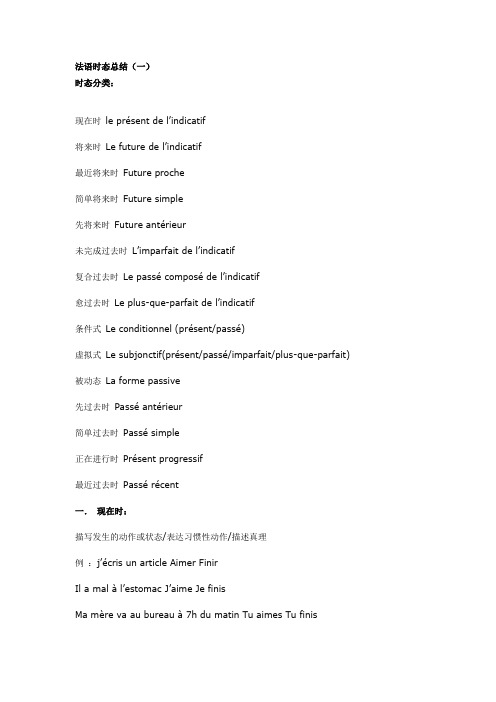
法语时态总结(一)时态分类:现在时le présent de l’indicatif将来时Le future de l’indicatif最近将来时Future proche简单将来时Future simple先将来时Future antérieur未完成过去时L’imparfait de l’indicatif复合过去时Le passé composé de l’indicatif愈过去时Le plus-que-parfait de l’i ndicatif条件式Le conditionnel (présent/passé)虚拟式Le subjonctif(présent/passé/imparfait/plus-que-parfait) 被动态La forme passive先过去时Passé antérieur简单过去时Passé simple正在进行时Présent progressif最近过去时Passé récent一.现在时:描写发生的动作或状态/表达习惯性动作/描述真理例:j’écris un article Aimer FinirIl a mal à l’estomac J’aime Je finisMa mère va au bureau à 7h du matin Tu aimes Tu finisL’eau bout à 100°c Il/elle aime Il/elle finitJ’arrive tout de suit Nous aimons Nous finissonsVous aimez Vous finissezIls/elles aiment Ils/elles finissent动词分组:第一组(-er) 第二组(-ir) 第三组(-re)二.简单将来时动词变化:以-rai -ras -ra -ra -rons -rez -ront -ront 结尾Etre AvoirJe serai J’auraiTu seras Tu aurasIl/elle sera Il/elle auraNous serons Nous auronsVous serez Vous aurezIls/elles seront Ils/elles auront例:Demain j’irai au cinéma.Elle sera ici demail.三.最近过去时四.最近将来时表达刚刚结束的动作Aller+动词原形Venir de +动词原形Je vais aller au cinéma.我将要去电影院Je viens de partir.我刚刚走五.未完成过去时动词变化:以-ais -ais -ait -ait –ions- iez –aient –aient结尾表达过去描写的背景/ 环境/人物未完成过去时主要表达/描写/叙述/事情表达过去发生的习惯性动作Hier martin ,il faisait mauvais, le ciel était nuageux.昨天早上天气很坏,乌云密布Quand j’étais à paris ,je me promenais tout les jours au bord de la Seine.当我在巴黎的时候,每天我都去河边散步比较最近将来时未完成过去时最近过去时IL est sept heurts, le match va finir. 现在七点,比赛马上结束IL était sept heurts le match allais finir. 那时是7点,比赛马上结束Ma fille est contente, elle viens de recevoir un cadeau.我女儿很高兴,他刚刚收到一个礼物Ma fille étais contente , elle venait de recevoir un cadeau.我女儿那时很高兴,他刚收到一个礼物六.复合过去时表示已经结束的动作动词变化être(avoir)+过去分词Il est sorti 他出去了Elle a démenagé他已经搬家了Etre做助动词用于venir partir entrer montre desendre reste tombre sortir等注以se 形式的自反动词也用être做助动词剩下用avoir做助动词第一组动词将词尾-er换成-é parler parlé第二组动词将词尾-ir换成-i finir fini第三组动词有四种词尾:-i -u -s -t sortirrépondremettredire sortirépondumisdit有些第三组动词过去分词:avoir euêtre étéfaire faitlire luattendre attenduentendre entenduconnaître connuvouloir voulupouvoir pusavoir suvoir vuboire bufalloir fallupleuvoir pluprendre priscomprendre comprisecrire écritBien, déjà, beaucoup, encore等副词放在助动词与过去分词之间。
法语各个时态详细介绍整理版
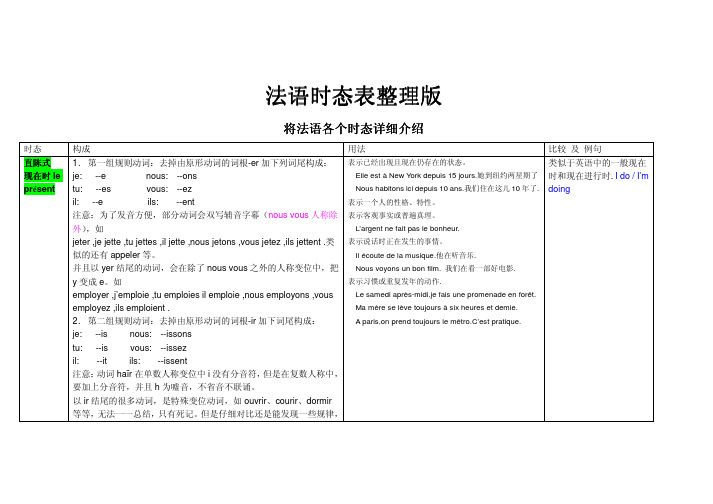
法语时态表法语时态表整理版整理版将法语各个时态将法语各个时态详细介绍详细介绍时态 构成用法比较 及 例句直陈式现在时le pr ésent1. 第一组规则动词:去掉由原形动词的词根-er 加下列词尾构成: je: --e nous: --ons tu: --es vous: --ez il: --e ils: --ent注意:为了发音方便,部分动词会双写辅音字幕(nous vous 人称除外),如jeter ,je jette ,tu jettes ,il jette ,nous jetons ,vous jetez ,ils jettent .类似的还有appeler 等。
并且以yer 结尾的动词,会在除了nous vous 之外的人称变位中,把y 变成e 。
如employer ,j’emploie ,tu emploies il emploie ,nous employons ,vous employez ,ils emploient .2. 第二组规则动词:去掉由原形动词的词根-ir 加下词尾构成: je: --is nous: --issons tu: --is vous: --issez il: --it ils: --issent 注意:动词haïr 在单数人称变位中i 没有分音符,但是在复数人称中,要加上分音符,并且h 为嘘音,不省音不联诵。
以ir 结尾的很多动词,是特殊变位动词,如ouvrir 、courir 、dormir 等等,无法一一总结,只有死记。
但是仔细对比还是能发现一些规律,表示已经出现且现在仍存在的状态。
Elle est à New York depuis 15 jours.她到纽约两星期了 Nous habitons ici depuis 10 ans.我们住在这儿10年了. 表示一个人的性格、特性。
表示客观事实或普遍真理。
L’argent ne fait pas le bonheur. 表示说话时正在发生的事情。
法语语法时态复习归纳(French grammar, tense, review, inductio

法语语法时态复习归纳(French grammar, tense, review,induction)现在时 present indicative变位方法.第一组动词 (通常为.): 参见 love注意一些第一组动词由于发音需要, 在变位时会有所变化.以 - outside, eter结尾的第一组动词, 如appeler, throw, 在单数所有人称, 以及复数第三人称的变位中, 词尾字母变为 "he", "tt".以 (, ger结尾的第一组动词, 如commencer, eat, 在复数第一人称时词尾应改为? ons, conduct.以 - yesterday, oyer, uyer结尾的第一组动词, 如essayer, send 在单数所有人称, 以及复数第三人称的变位中, 词尾字母由y变为i bore.第二组动词 (通常为 ir) 参见 finish例外: go out, run, open, go, sleep 等第三组动词: 不规则变化.动词提示.i 法语中的有两个助动词être 和two auxiliary fran? ais:, and. in general, for the training of emploieen time except when the verb compounds are estpassif: i'm dead.变位提示.直陈式复合过去时用于表示过去已经完成的动作或某一已经完成的动作是发生在多少时间内的 (indicative tense).ex:he's out.he worked the whole afternoon.变位方法.由助动词avoir或être的直陈式现在时加上动词的过去分词.当使用être作为助动词时, 注意与主语进行性数配合 are parties.提示.对于 "必须" 或者 "可以" 用être作为助动词的单词, 《法语助手》会在该动词的 "动词说明" 中加以说明, 未说明的动词只能使用avoir作为助动词.下列常用动词使用être作为助动词.go, come, come, come out.下列常用动词可以使用avoir或être作为助动词, 但表达的意义不同.go, go, go, go动词提示.i 法语中的有两个助动词être 和two auxiliary fran? ais:, and. in general, for the training of emploieen time except when the verb compounds are estpassif: i'm dead.变位提示.未完成过去时主要用于表示过去未完成的动作 (indicative imperfect).变位方法: 将该动词现在时第一人称复数的词尾 ons 去除, 添加相应的词尾.i havedo you havehe / she hasthe ionyou likelythey should have例外: être不符合上面的规则.动词提示.i 法语中的有两个助动词être 和two auxiliary fran? ais:, and. in general, for the training of emploieen time except when the verb compounds are estpassif: i'm dead.变位提示.直陈式俞过去时 (indicative past perfect) 表示某个动作在另一个过去的动作开始之前已经完成, 常用于复合句.when i arrived, he had finished his work.与简单将来时配合用于si引导的条件从句.if i had money, i would have bought that house.变位方法.由助动词avoir或être的未完成过去时加上动词的过去分词.当使用être作为助动词时, 注意与主语进行性数配合.提示.对于 "必须" 或者 "可以" 用être作为助动词的单词, 《法语助手》会在该动词的 "动词说明" 中加以说明, 未说明的动词只能使用avoir作为助动词.下列常用动词使用être作为助动词.go, come, come, come out.下列常用动词可以使用avoir或être作为助动词, 但表达的意义不同.go, go, go, go动词提示.i 法语中的有两个助动词être 和two auxiliary fran? ais:, and. in general, for the training of emploieen time except when the verb compounds are estpassif: i'm dead.变位提示.直陈式简单过去时表示在过去某一确定时间内已经完成的动作(indicative past tense).变位方法.除去某些特殊情况外, 在动词词根后加上以下词尾.第一组动词.i havedo you havehe / she hasour soulsyou saidthey do show some 第二组动词.what iswhat ishe / she / itwe -? mydo you do? your they went to.第二组动词.i - usyou ushe / she maywe -? mydo you do? yourthey - people下列单词的变位较特殊.here,,,动词提示.i 法语中的有两个助动词être 和two auxiliary fran? ais:, and. in general, for the training of emploieen time except when the verb compounds are estpassif: i'm dead.变位提示.直陈式先过去时 (indicative past 表示发生在另一过去动作之前的动作, 但两个动作之间距离较近 prior).变位方法.由助动词avoir或être的简单过去时加上动词的过去分词.当使用être作为助动词时, 注意与主语进行性数配合.提示.对于 "必须" 或者 "可以" 用être作为助动词的单词, 《法语助手》会在该动词的 "动词说明" 中加以说明, 未说明的动词只能使用avoir作为助动词.下列常用动词使用être作为助动词.go, come, come, come out.下列常用动词可以使用avoir或être作为助动词, 但表达的意义不同.go, go, go, go动词提示.i 法语中的有两个助动词être 和two auxiliary fran? ais:, and. in general, for the training of emploieen time except when the verb compounds are estpassif: i'm dead.类似变位的动词.have变位提示.直陈式简单将来时 (future 表示将要发生的行为或状态 code)变位方法.第一、二组动词: 在动词不定式后加上下列词尾.i havedo you havehe / she haswe do.- ezthey have以 - re结尾的第三组动词需要首先去掉词尾的 - e再加上述词尾. 注意下列单词的特殊变化.you, go, run, see, to...动词提示.i 法语中的有两个助动词être 和two auxiliary fran? ais:, and. in general, for the training of emploieen time except when the verb compounds are estpassif: i'm dead.变位提示.直陈式简单将来时 (future 表示将要发生的行为或状态 code)变位方法.第一、二组动词: 在动词不定式后加上下列词尾.i havedo you havehe / she haswe do.- ezthey have以 - re结尾的第三组动词需要首先去掉词尾的 - e再加上述词尾.注意下列单词的特殊变化.you, go, run, see, to...动词提示.i 法语中的有两个助动词être 和two auxiliary fran? ais:, and. in general, for the training of emploieen time except when the verb compounds are estpassif: i'm dead.变位提示.this 虚拟式现在时subjonctif变位方法: 对于第一组和第二组动词, 除去直陈式现在时复数第三人称的词尾 ent, 加上下面的词尾.i - eare youhe / she.the ionyou likelythey / she ent动词提示.i 法语中的有两个助动词être 和two auxiliary fran? ais:, and. in general, for the training of emploieen time except when the verb compounds are estpassif: i'm dead.变位提示.虚拟式过去时subjonctif past变位方法: 由助动词avoir或être的虚拟式加上动词的过去分词构成.当使用être作为助动词时, 注意与主语进行性数配合.提示.对于 "必须" 或者 "可以" 用être作为助动词的单词, 《法语助手》会在该动词的 "动词说明" 中加以说明, 未说明的动词只能使用avoir作为助动词.下列常用动词使用être作为助动词.go, come, come, come out.下列常用动词可以使用avoir或être作为助动词, 但表达的意义不同.go, go, go, go动词提示.i 法语中的有两个助动词être 和two auxiliary fran? ais:, and. in general, for the training of emploieen time except when the verb compounds are estpassif: i'm dead.变位提示.虚拟式未完成过去时subjonctif imperfect变位方法: 由直陈式简单过去时第二人称单数去掉词尾 ("i" 或者"), 加下列词尾构成- essi gesshe / she do? twe ourselvesyou ssiezIls/elles -ssentHint: the subjunctive tense of the second verbs and the virtual tense, the last tense, the third person, the singular, and the rest are the same.Verb prompt:In French there are two verbs: tre and avoirDeux auxiliaires en Fran tre et avoir.? AIS: the Avoirs'emploieen g n pour la formation des ral temps compos s sauf lorsque Le verbe estpassif o on utilise tre 'is connected: JE suis mort.Shift hint:Virtual Yu past Subjonctif Plus-que-parfaitA method by virtual auxiliary avoir or tre did not complete the past and the past participle of the verb.When using the tre as a verb, with the attention and the subject of the number of.Prompt:The "must" or "can" use the tre as a verb in French words, "assistant" will be described in the verb "verb", the verb can only not demonstrated using avoir as a verb.The use of TRE as the common verb verb:Aller, sortir, arriver, venir, entrerThe following verbs can use avoir or tre as the auxiliary verb, but different meaning.Sortir, rentrer, descendre, monterVerb prompt:In French there are two verbs: tre and avoirDeux auxiliaires en Fran tre et avoir.? AIS: the Avoirs'emploieen g n pour la formation des ral temps compos s sauf lorsque Le verbe estpassif o on utilise tre 'is connected: JE suis mort.Shift hint:Now when the conditions (Conditionnel Pr sent) tone mildly desire, requests for said independent sentence, compound sentence that may occur for an assumed conditions, for example: Si j'tais vous, JE ferais autrement.Displacement method:The future consists of simple root and the suffix:JE -aisTu -aisIl/elle -aitNous -ionsVous -iezIls/elles -aientVerb prompt:In French there are two verbs: tre and avoirDeux auxiliaires en Fran tre et avoir.? AIS: the Avoirs'emploieen g n pour la formation des ral temps compos s sauf lorsque Le verbe estpassif o on utilise tre 'is connected: JE suis mort.Shift hint:Conditional tense (Conditionnel Pass)A method consists of a verb avoir or 'tre' conditional now with the past participle of the verb.When using the tre as a verb, with the attention and the subject of the number of.Prompt:The "must" or "can" use the tre as a verb in French words, "assistant" will be described in the verb "verb", the verb can only not demonstrated using avoir as a verb.The use of TRE as the common verb verb:Aller, sortir, arriver, venir, entrerThe following verbs can use avoir or tre as the auxiliary verb,but different meaning.Sortir, rentrer, descendre, monterVerb prompt:In French there are two verbs: tre and avoirDeux auxiliaires en Fran tre et avoir.? AIS: the Avoirs'emploieen g n pour la formation des ral temps compos s sauf lorsque Le verbe estpassif o on utilise tre 'is connected: JE suis mort.Shift hint:命令式现在时表达命令、禁止等主观态度 (imperative).变位方法: 命令式只有第一人称单数, 第二人称单、复数三种变位形式, 变位形式通常于直陈式现在时相同.注意: 对于第一组动词以及 - ir为词尾的动词, 第二人称单数的命令式需要去掉词尾的 - s: 例如parler you talk - talk.动词提示.i 法语中的有两个助动词être 和two auxiliary fran? ais:, and. in general, for the training of emploieen time except when the verb compounds are estpassif: i'm dead.命令式过去时 (imperative)变位方法: 命令式过去时只有第一人称单数, 第二人称单、复数三种变位形式, 由助动词avoir或être的命令式现在时加上动词的过去分词构成.当使用être作为助动词时, 注意与主语进行性数配合.-提示.对于 "必须" 或者 "可以" 用être作为助动词的单词, 《法语助手》会在该动词的 "动词说明" 中加以说明, 未说明的动词只能使用avoir作为助动词.下列常用动词使用être作为助动词.go, come, come, come out.下列常用动词可以使用avoir或être作为助动词, 但表达的意义不同.go, go, go, go动词提示.i 法语中的有两个助动词être 和two auxiliary fran? ais:, and. in general, for the training of emploieen time except when the verb compounds are estpassif: i'm dead.present indicativei amare youit iswe areare youthey areindicative tensei've beenyou've beenit has beenwe have beenyou have beenthey have beenthe imperfect indicativei wasyou wereit waswe wereyou werethey werepluperfect indicative i had beenyou've beenhe had beenwe avionsétéyou've beenthey had beenpast simple codei wasyou've beenit waswe f? myyou do? yourthey werethe previous code history i had beenyou have beenit would have beenwe e? my summeryou e? your summerthey had beenfuture simple codei'll beyou'll beit will bewe will beyou will bethey will befuture indicative past i have beenyou have beenit has beenwe have beenyou have beenthey have beenpresent subjunctivei'myou'reit iswe areyou'rethey arethe subjunctive pasti've beenyou've beenhe has beenwe have beenyou have beenthey have beenthe imperfect subjunctive if i hadyou werethe f? tas we werethat you werethey werepluperfect subjunctive i would have beenthat i wasthat it? t beenwe have beenyou'd beenthey had been conditional on thisi'd beyou'd beit would bewe would beyou'd bethey would be conditional on pasti / i would have beenyou could / washe would / e? t beenwe should / would (s)do you have / had been (s) they would have been (s). is this(you) youlet us (we)(you) youessential history(i) have been(i) have been(i) have beenthe present participle sincepast participle summerhavepresent indicative ido you havehe haswe havedo you havethey have indicative tensei've beenyou gotit has beenwe have hadyou have beenthey have beenthe imperfect indicative i haddo you havehe hadwe haddo you havethey hadpluperfect indicativei hadyou hadhe had beenwe hadyou hadthey hadpast simple codei haddo you havehe hadwe e? myyou e? yourthey hadthe previous code history i had beenyou have beenhe had beenwe e? i hadyou e? you hadthey had beenfuture simple codei havedo you haveit will bewe havedo you havethey will befuture indicative past i have hadyou getit has beenwe have hadyou have hadthey have beenpresent subjunctivei haveyouhe haswe haveyou havethey havethe subjunctive pasti ever had.you hadhe hadwe have hadyou hadthey have beenthe imperfect subjunctive i haveyou ithat it? twe haveyou'dthey hadpluperfect subjunctive i would have beeni had youthat it? uwe have hadyou'd beenthey had been conditional on thisi should havedo you havehe would havewe havedo you havethey would haveconditional on pasti would, i would haveyou and i havehe would / e? uwe have had a (s).do you have / had been (s) they would have been (s). is this(i) to have(i) to haveyou (you)essential history(i) have been(i) have been(i) have beenthe present participle withpast participlein。
法语语法知识整理
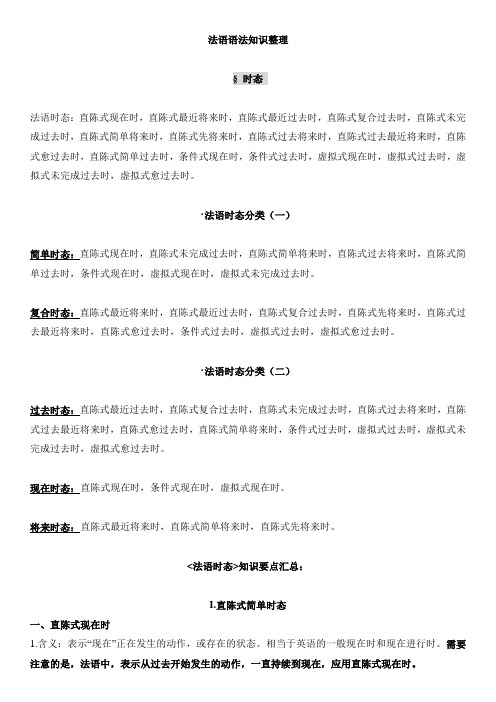
法语语法知识整理§时态法语时态:直陈式现在时,直陈式最近将来时,直陈式最近过去时,直陈式复合过去时,直陈式未完成过去时,直陈式简单将来时,直陈式先将来时,直陈式过去将来时,直陈式过去最近将来时,直陈式愈过去时,直陈式简单过去时,条件式现在时,条件式过去时,虚拟式现在时,虚拟式过去时,虚拟式未完成过去时,虚拟式愈过去时。
·法语时态分类(一)简单时态:直陈式现在时,直陈式未完成过去时,直陈式简单将来时,直陈式过去将来时,直陈式简单过去时,条件式现在时,虚拟式现在时,虚拟式未完成过去时。
复合时态:直陈式最近将来时,直陈式最近过去时,直陈式复合过去时,直陈式先将来时,直陈式过去最近将来时,直陈式愈过去时,条件式过去时,虚拟式过去时,虚拟式愈过去时。
·法语时态分类(二)过去时态:直陈式最近过去时,直陈式复合过去时,直陈式未完成过去时,直陈式过去将来时,直陈式过去最近将来时,直陈式愈过去时,直陈式简单将来时,条件式过去时,虚拟式过去时,虚拟式未完成过去时,虚拟式愈过去时。
现在时态:直陈式现在时,条件式现在时,虚拟式现在时。
将来时态:直陈式最近将来时,直陈式简单将来时,直陈式先将来时。
<法语时态>知识要点汇总:I.直陈式简单时态一、直陈式现在时1.含义:表示“现在”正在发生的动作,或存在的状态。
相当于英语的一般现在时和现在进行时。
需要注意的是,法语中,表示从过去开始发生的动作,一直持续到现在,应用直陈式现在时。
2.用法:①表示现在存在的状态,经常发生的动作。
②表示一个人的性格、特征。
③表示客观事实或普遍真理。
需要注意的是,当直接引语变间接引语时,如果引语部分是客观事实或普遍真理,从句的时态用直陈式现在时,不与主句的时态做配合。
④表示说话时正在发生的事情。
二、直陈式未完成过去时1.表示过去当时正在发生的事情,相当于过去进行时,表示这件事的发生的起止时间是不明确的,在所谈到的时间段内一直延续进行。
法语语法:法语时态总结

法语语法:法语时态总结时态总结下面是对法语时态的总结(和英语相对照)。
法语英语Present Tenses直陈式现在时(aimer): 一般现在时: 现在进行时:J’aime I love I am loving过去时未完成过去时: 一般过去时: 过去进行时:J’aimais I loved I was loving简单过去时: 一般过去时:J’aimai I loved完成时复合过去时: 现在完成时一般过去时:J’ai aimé I have loved I loved将来时简单将来时: 一般将来时(will + inf.)将来进行时:J’aimerai I will love I will be loving最近将来时(用aller): 一般将来时(going to + inf.):Je vais aimer I am going to love先将来时: 将来完成时: 将来完成进行时:J’aurai aimé I will have loved I will have been loving过去完成时先过去时: 过去完成时:J’eus aimé I had loved愈过去时: 过去完成时: 过去完成进行时:J’avais aimé I had loved I had been loving条件式条件式现在时: 现在条件式:J’aimerais I would love条件式过去时: 过去条件式:J’aurais aimé I would have loved虚拟式虚拟式现在时: 现在时虚拟语气:que j’aime that I love虚拟式未完成过去时: 过去时虚拟语气:que j’aimasse that I loved虚拟式过去时: 现在完成时虚拟语气 :que j’aie aimé that I would have loved虚拟式愈过去时: 过去完成时虚拟语气:que j’eusse aimé that I had loved时态的配合法语复合句中,时态的配合如下表;当主句动词是现在时或将来时,从句动词是:主句从句现在时现在时将来时现在时未完成过去时简单过去时复合过去时愈过去时复合过去时当主句动词是过去时,从句动词是:主句从句未完成过去时简单过去时未完成过去时先将来时未完成过去时复合过去时先过去时愈过去时。
法语时态总结

法语时态总结简单版时态分类:现在时le présent de l’indicatif将来时Le future de l’indicatif最近将来时Future proche简单将来时Future simple未完成过去时L’imparfait de l’indicatif复合过去时L e passé composé de l’indicatif被动态La forme passive一.现在时:描写发生的动作或状态/表达习惯性动作/描述真理例:j’écris un article Aimer FinirIl a m al à l’estomac J’aime Je finisMa mère va au bureau à 7h du matin Tu aimes Tu finisL’eau bout à 100°c Il/elle aime Il/elle finitJ’arrive tout de suit Nous aimons Nous finissonsVous aimez Vous finissezIls/elles aiment Ils/elles finissent 动词分组:第一组(-er) 第二组(-ir) 第三组(-re)二.简单将来时动词变化:以-rai -ras -ra -ra -rons -rez -ront -ront 结尾Etre AvoirJe serai J’auraiTu seras Tu aurasIl/elle sera Il/elle auraNous serons Nous auronsVous serez Vous aurezIls/elles seront Ils/elles auront例:Demain j’irai au cinéma.Elle sera ici demail.三.最近过去时四.最近将来时表示马上就要进行的动作Aller+动词原形表达刚刚结束的动作Venir de +动词原形Je vais aller au cinéma.我将要去电影院Je viens de partir.我刚刚走五.未完成过去时动词变化:以-ais -ais -ait -ait –ions- iez –aient –aient结尾表达过去描写的背景/ 环境/人物未完成过去时主要表达/描写/叙述/事情表达过去发生的习惯性动作Hier martin ,il faisait mauvais, le ciel était nuageux.昨天早上天气很坏,乌云密布Quand j’étais à Paris ,je me promenais tous les jours le long de la Seine.当我在巴黎的时候,每天我都去河边散步六.复合过去时表示已经结束的动作动词变化être(avoir)+过去分词Il est sorti 他出去了Elle a démenagé他已经搬家了Etre做助动词用于venir partir entrer montre desendre reste tombre sortir等注以se 形式的自反动词也用être做助动词剩下用avoir做助动词第一组动词将词尾-er换成-é parler parlé第二组动词将词尾-ir换成-i finir fini第三组动词有四种词尾:-i -u -s -t sortirrépondremettredire sortirépondumisdit有些第三组动词过去分词:avoir eu être été faire fait lire lu attendre attendu entendre entendu connaître connu vouloir voulu pouvoir pu savoir su voir vu boire bu falloir fallu pleuvoir plu prendre pris comprendre compris écrire écritBien, déjà, beaucoup, encore等副词放在助动词与过去分词之间。
法语时态
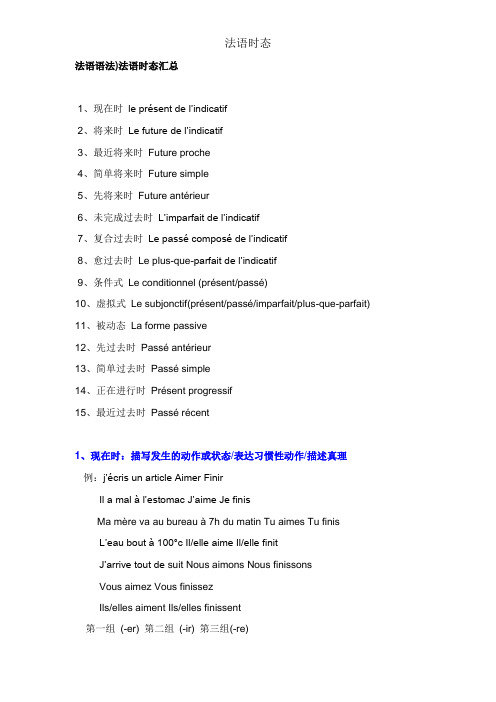
法语语法)法语时态汇总1、现在时le présent de l’indicatif2、将来时Le future de l’indicatif3、最近将来时Future proche4、简单将来时Future simple5、先将来时Future antérieur6、未完成过去时L’imparfait de l’indicatif7、复合过去时Le passé composé de l’indicatif8、愈过去时Le plus-que-parfait de l’indicatif9、条件式Le conditionnel (présent/passé)10、虚拟式Le subjonctif(présent/passé/imparfait/plus-que-parfait)11、被动态La forme passive12、先过去时Passé antérieur13、简单过去时Passé simple14、正在进行时Présent progressif15、最近过去时Passé récent1、现在时:描写发生的动作或状态/表达习惯性动作/描述真理例:j’écris un article Aimer FinirIl a mal à l’estomac J’aime Je finisMa mère va au bureau à 7h du matin Tu aimes Tu finis L’eau bout à 100°c Il/elle aime Il/elle finitJ’arrive tout de suit Nous aimons Nous finissonsVous aimez Vous finissezIls/elles aiment Ils/elles finissent第一组(-er) 第二组(-ir) 第三组(-re)2、简单将来时动词变化:以-rai -ras -ra -ra -rons -rez -ront -ront 结尾Etre AvoirJe serai J’auraiTu seras Tu aurasIl/elle sera Il/elle auraNous serons Nous auronsVous serez Vous aurezIls/elles seront Ils/elles auront例:Demain j’irai au cinéma.Elle sera ici demail.3、最近过去时venir de +faire(动词原型)表示刚刚结束或刚刚发生的动作,这里的venir失去了"去"的意思例如:Il vient d'etre dix heure. 刚刚10点Nous venons d'sortir de la classe.我们刚刚离开教室。
语法:法语语法之时态汇总(2)
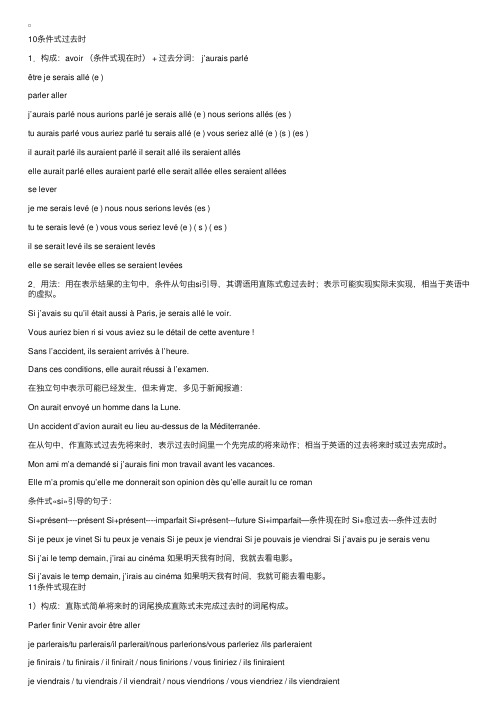
10条件式过去时1.构成:avoir (条件式现在时) + 过去分词: j’aurais parléêtre je serais allé (e )parler allerj’aurais parlé nous aurions parlé je serais allé (e ) nous serions allés (es )tu aurais parlé vous auriez parlé tu serais allé (e ) vous seriez allé (e ) (s ) (es )il aurait parlé ils auraient parlé il serait allé ils seraient alléselle aurait parlé elles auraient parlé elle serait allée elles seraient alléesse leverje me serais levé (e ) nous nous serions levés (es )tu te serais levé (e ) vous vous seriez levé (e ) ( s ) ( es )il se serait levé ils se seraient levéselle se serait levée elles se seraient levées2.⽤法:⽤在表⽰结果的主句中,条件从句由si引导,其谓语⽤直陈式愈过去时;表⽰可能实现实际未实现,相当于英语中的虚拟。
Si j’avais su qu’il était aussi à Paris, je serais allé le voir.Vous auriez bien ri si vous aviez su le détail de cette aventure !Sans l’accident, ils seraient arrivés à l’heure.Dans ces conditions, elle aurait réussi à l’examen.在独⽴句中表⽰可能已经发⽣,但未肯定,多见于新闻报道:On aurait envoyé un homme dans la Lune.Un accident d’avion aurait eu lieu au-dessus de la Méditerranée.在从句中,作直陈式过去先将来时,表⽰过去时间⾥⼀个先完成的将来动作;相当于英语的过去将来时或过去完成时。
- 1、下载文档前请自行甄别文档内容的完整性,平台不提供额外的编辑、内容补充、找答案等附加服务。
- 2、"仅部分预览"的文档,不可在线预览部分如存在完整性等问题,可反馈申请退款(可完整预览的文档不适用该条件!)。
- 3、如文档侵犯您的权益,请联系客服反馈,我们会尽快为您处理(人工客服工作时间:9:00-18:30)。
语法:法语语法之时态汇总(2)10条件式过去时1.构成:avoir (条件式现在时) + 过去分词: j’aurais parléêtre je serais allé (e )parler allerj’aurais parlé nous aurions parlé je serais allé (e ) nous serions allés (es )tu aurais parlé vous auriez parlé tu serais allé (e ) vous seriez allé (e ) (s ) (es )il aurait parlé ils auraient parlé il serait allé ils seraient alléselle aurait parlé elles auraient parlé elle serait allée elles seraient alléesse leverje me serais levé (e ) nous nous serions levés (es )tu te serais levé (e ) vous vous seriez levé (e ) ( s ) ( es )il se serait levé ils se seraient levéselle se serait levée elles se seraient levées2.用法:用在表示结果的主句中,条件从句由si引导,其谓语用直陈式愈过去时;表示可能实现实际未实现,相当于英语中的虚拟。
Si j’avais su qu’il était aussi à Paris, je serais allé le voir.Vous auriez bien ri si vous aviez su le détail de cette aventure !Sans l’accident, ils seraient arrivés à l’heure.Dans ces conditions, elle aurait réussi à l’examen.在独立句中表示可能已经发生,但未肯定,多见于新闻报道:On aurait envoyé un homme dans la Lune.Un accident d’avion aurait eu lieu au-dessus de la Méditerranée.在从句中,作直陈式过去先将来时,表示过去时间里一个先完成的将来动作;相当于英语的过去将来时或过去完成时。
Mon ami m’a demandé si j’aurais fini mon travail avant les vacances.Elle m’a promis qu’elle me donnerait son opinion dès qu’elle aurait lu ce roman条件式?si?引导的句子:Si+présent----présent Si+présent----imparfait Si+présent---future Si+imparfait—条件现在时 Si+愈过去---条件过去时Si je peux je vinet Si tu peux je venais Si je peux je viendrai Si je pouvais je viendrai Si j’avais pu je serais venuSi j’ai le temp demain, j’irai au cinéma 如果明天我有时间,我就去看电影。
Si j’avais le temp demain, j’irais au cinéma 如果明天我有时间,我就可能去看电影。
11条件式现在时1)构成:直陈式简单将来时的词尾换成直陈式未完成过去时的词尾构成。
Parler finir Venir avoir être allerje parlerais/tu parlerais/il parlerait/nous parlerions/vous parleriez /ils parleraientje finirais / tu finirais / il finirait / nous finirions / vous finiriez / ils finiraientje viendrais / tu viendrais / il viendrait / nous viendrions / vous viendriez / ils viendraientj'aurais / tu aurais / il aurait / nous aurions / vous auriez / ils auraientje serais / tu serais / il serait / nous serions / vous seriez / ils seraientj'irais / tu irais / il irait / nous irions / vous iriez / ils iraient2)用法:1.用在表示结果的主句中,从句用si引导,其谓语用直陈式未完成过去时;相当于英语中表示现在或将来情况的虚拟条件句。
1)表示与现在事实相反 Si j’étais vous, j’irais chez le dentiste tout de suite.2)表示将来可能实现的动作:Est-ce que cela t’ennuierait beaucoup si nous allions au cinéma un autre jour ?如果动作实现的可能性极大,则主句用直陈式简单将来时,从句用直陈式现在时;相当于英语的真实条件句:S’il fait beau demain, nous irons au parc prendre des photos.条件从句也可由其他表示条件的词组代替:A votre place, j’apprendrais le fran?ais comme seconde langue étrangère.Avec des si, on mettrait Paris dans une bouteille.2.用在表示愿望、请求、建议、推测的独立句中,能表达委婉语气;相当于英语中情态动词用法J’aimerais faire le tour du monde. (I’d like to travel round the world.)Pourrais-je écouter cette cassette avant de l’acheter ? (Could I listen to this cassette before buying it? )Vous feriez mieux de suivre le conseil du médecin. (You’d better follow the doctor’s advice.)3.用作直陈式过去将来时,表示过去某一动作之后将要发生的事情,相当于英语的一般过去将来时。
Ses parents ne savaient pas si le train arriverait à l’heure.Le professeur a dit qu’on aurait un examen le lendemain.12虚拟式现在时:虚拟式现在时由直陈式现在时第三人称复数去掉词尾ent,换上词尾-e, -es, -e, -ions, -iez, -ent构成。
parler —— ils parlentque je parle /que nous parlions /que tu parles /que vous parliez /qu’il parle /qu’ils parlentfinir —— ils finissentque je finisse /que nous finissions /que tu finisses /que vous finissiez /qu’il finisse /qu’ils finissent少数例外动词:avoir être allerque j’aie/que tu aies/qu’il ait/que nous ayons/que vous ayez/qu’ils aientque je sois/que tu sois/qu’il soit/que nous soyons/que vous soyez/qu’ils soientque j’aille/que tu ailles/qu’il aille/que nous allions/que vous alliez/qu’ils aillentFaire Pouvoir Vouloirque je fasse/que tu fasses/qu’il fasse/que nous fassions/que vous fassiez/qu’ils fassentque je puisse/que tu puisses/qu’il puisse/que nous puissions/que vous puissiez/qu’ils puissentque je veuille/que tu veuilles/qu’il veuille/que nous voulions/que vous vouliez/qu’ils veuillent /savoir venir prendre1.主句谓语表示愿望、请求、命令、禁止等vouloir, désirer, aimer, préférer, demander, permettre, ordonner, interdireMes parents veulent que j’apprenne deux langues étrangères.Il n’aime pas qu’on dise des choses désagréables.2.主语谓语表示快乐、悲伤、愤怒、惊奇、遗憾、害怕等être content, être heureux , être fier, être mécontent, être triste, être étonné, regretter, avoir peur, craindre …Nous sommes contents qu’on installe bient?t le climatiseur dans la maison.Le ma?tre est étonné que Toto soit si paresseux.主句谓语表示害怕、担心,从句谓语前一般加赘词ne, 如果从句为否定句,则为ne … pas J’ai peur que vous ne manquiez le train.On craint qu’elle ne vienne pas au bal.3.主句谓语表示怀疑、否定、应该、可能与否等il est douteux il fautdouter il est importantil vaut mieux il sembleil est possible il est naturel…Je doute qu’ils remettent leur voyage à cause de la pluie.Il faut que vous vous arrêtiez au feu rouge.Il est possible qu’ils prennent le même avion pour aller au Japon.条件式为完成过去时:词尾加-sse -sses –(?t ?t) -ssions -ssiez -ssent。
